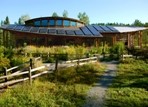Planning for Climate Change
Climate change is already impacting the U.S. Midwest with higher average temperatures, more frequent heavy downpours, decreased Great Lakes ice cover, and more frequent heat waves.
Projected future climate changes in the region include a likely rise of another 5-10 degrees Fahrenheit by 2100, continued increases in winter and spring precipitation, decreased summer precipitation, and a possible drop in Great Lakes water levels.
The region will likely face the greatest adaptation challenges along Great Lakes coasts and waterways, as this is where many significant economic and ecological impacts will occur as a result of a changing climate.
While climate impacts will vary regionally, it is at the state and local levels where critical policy and investment decisions are made for the systems most likely to be affected — water, land use, energy, transportation and public health and natural resources, as well as important economic sectors such as agriculture, fisheries, forestry, manufacturing, and tourism. By factoring a changing climate into planning decisions today, communities and agencies can avoid future costs.
Find out more at “Planning for Climate Change Impacts in the Western Lake Superior Region” on Thursday, Sept. 22, from 8 a.m. til 5 p.m., a workshop geared for planners and professionals, but open to everyone. The workshop will be held at the EPA Midcontinent Division (map) and costs $20, which includes speakers, lunch and materials. Registration is available online.


















